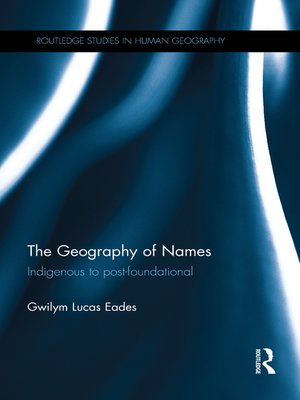The Geography of Names
ebook ∣ Indigenous to post-foundational · Routledge Studies in Human Geography
By Gwilym Lucas Eades

Sign up to save your library
With an OverDrive account, you can save your favorite libraries for at-a-glance information about availability. Find out more about OverDrive accounts.
Find this title in Libby, the library reading app by OverDrive.



Search for a digital library with this title
Title found at these libraries:
| Library Name | Distance |
|---|---|
| Loading... |
This book examines geographical names, place-names, and toponymy from philosophical and cultural evolutionary perspectives. Geographical name-tracking-networks (Geo-NTNs) are posited as tools for tracking names through time and across space, and for making sense of how names evolve both temporally and spatially. Examples from North and South American indigenous groups, the Canadian arctic, Wales, England, and the Middle East are brought into a theoretical framework for making sense of aspects of place-naming practices, beliefs, and systems. New geographical tools such as geographic information systems (GIS) and global positioning systems (GPS) are demonstrated to be important in the production and maintenance of robust networks for keeping names and their associated meanings viable in a rapidly changing world where place-naming is being taken up increasingly in social media and other new mapping platforms. The Geography of Names makes the case that geographical names are transmitted memetically (i.e. as cultural units, or memes) through what Saul Kripke called communication chains. Combining insights from Kripke with views of later Wittgenstein on language and names as being inherently spatial, the present work advances theories of both these thinkers into an explicitly geographical inquiry that advances philosophical and practical aspects of naming, language, and mapping.







